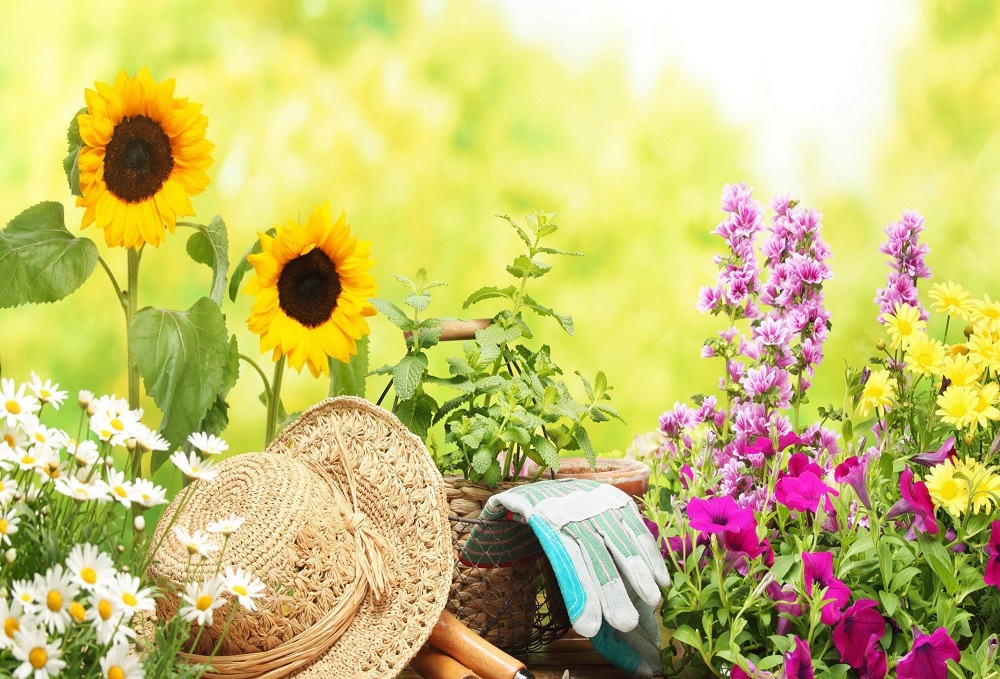Have you ever tried to plant a garden and discover you have a black thumb? Or did you surprise yourself by keeping your garden alive and well with your green thumb? No matter what color your garden thumb may be, these tips on herb garden will help you discover the best of the garden for your lifestyle. These tips will help you find the right spot, how to water your herb garden, harvesting tips, and some basics of what to do with your herbs.
Give Herbs their own S P A C E to grow
Several people like to have their herb gardens outside. If you are one of those, you will need to pick the best place for your herbs to grow so they have plenty of sunlight and good soil drainage.
I live in the south so NOTHING needs “plenty of direct sunlight,” it would burn up in the summer. I like to have my garden in the area with the most morning sun, this is my front yard. The afternoon sun tends to be hotter and will burn my little herbs to a crisp. I also plant my herbs in containers. It is easier to move them inside once it gets cooler. In my containers, my peppermint and my rosemary are in containers all by themselves. They grow and multiply quickly and would not like the company.
If you are planting your garden in the ground, you will need to make sure you have spaced your seeds/small plants about a foot apart. Some herbs will recommend more space, so please read the planting instructions on your seed packet or plant tab. For example, dill, parsley, cilantro, and chives, aim for about a foot between each plant. Other herbs require more space between them. Basil, tarragon, and thyme need approximately 2 feet between each plant and mint, oregano, sage, and rosemary like 3-4 feet of growing space.
Pick your Herbs for your lifestyle
There are many beginner gardeners that want to grow all herbs they find. However, if you don’t know how to use them or know what you will use them for, you probably don’t need those herbs. I like to pick my herbs for what I will be using in the coming year. There are several herbs that are great for beginners and can be used all year long. Cooking herbs and essential herbs are some of my favorites.
Some of my favorite cooking herbs are basil, dill, sage, rosemary, and oregano. I love walking to my herb garden, collecting my oregano and sage to make spaghetti sauce.
Some of my essential herbs are lavender and mint. These herbs help repel bugs and insects, and they are also great for making the house smell good. My son likes to pick a mint leaf and chew on it as he walks to school.
Start off small
When you are starting your herb garden, it is always good to start small. There are reasons you give mint and rosemary about 3 feet to grow, they grow to be big plants. You wouldn’t need to have several mint plants; one plant is good for a beginner. If you are using your herb plants on your patio, deck, or other outdoor living space to repel bugs and insects, then you would need more than one to cover each space. I have two lavender plants, one on my front porch and one in the back on the patio.
For my cooking herbs, I usually only have one plant of each. I get a good harvest from the oregano and rosemary for the year, if I trim it properly.
As you learn about herbs and how you like to use fresh herbs, you will feel more comfortable growing your garden to include more herbs.
Your Herbs will need water
Watering my little garden is the hardest thing for me to remember. There have been many plants that have died because I forgot to water them. I have tried many tricks, water glass tubes in the container, plastic bottle to self-water, adding a cup of water to the pot. But they all still need to be checked and water added to them.
I am better about watering now; I have a plant that droops it’s leaves when it needs water. This reminds me to check all my plants to see if they need water.
The amount of water needed for each plant is different. I have one that only needs water when it rains in the desert. I have one that needs misting daily and water weekly. I check the soil of each plant to see if it needs water. Checking the moisture of the soil a couple of inches down is the best way to see if your garden needs water. Many plants like to have moist soil. This is good for containers and for in-ground plants. Again, check your herb label to see what type of soil moisture your herb likes.
Herb gardens are a great addition to natural living. There are many benefits and pleasures from using herbs you have grown and that are right at your door. Enjoy starting your own herb garden.
